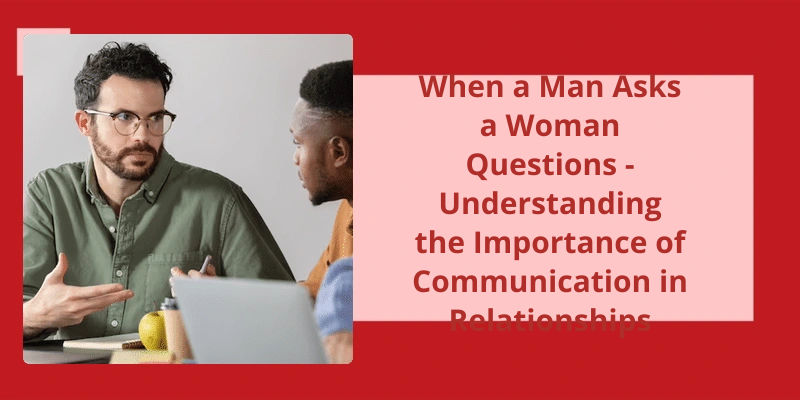As human beings, we’ve an innate desire to connect with others, to understand their thoughts and feelings, and to establish meaningful relationships. When it comes to dating, this desire is often amplified as we seek to find a partner with whom we can share our lives. One key aspect of building a connection with someone is through asking questions. When a man asks a woman questions, he’s not only showing curiosity about her life, but he’s also demonstrating that he values her opinion and wants to get to know her on a deeper level. However, there are certain nuances to asking questions that can make or break a conversation. It's important for men to approach the situation with sensitivity, respect, and a genuine desire to understand the woman they're speaking with. In this article, we'll explore some tips for how men can ask questions that foster connection and build strong relationships.
Why Would a Guy Ask Personal Questions?
It could be that the guy asking personal questions is genuinely interested in getting to know you as a person. He may be curious about your past experiences, your opinions, and your beliefs. Perhaps he values deeper connections and wants to build one with you. However, it’s important to proceed with caution. Some individuals may use personal information as a means of manipulation or control. If you feel uncomfortable or pressured, trust your instincts and set boundaries.
Another reason a guy may ask personal questions is because he wants to gauge your compatibility. He may be looking for shared interests or values, determining if you’ve the potential for a long-term relationship. In this scenario, it’s important to be truthful and authentic in your responses. If you try to mold yourself into someone youre not, it will only hinder the possibility of a genuine connection.
It’s also possible that the guy is seeking validation. If he asks about past relationships or experiences, he may be looking for reassurance that you find him interesting, attractive, or worthy of your time. While theres nothing inherently wrong with seeking validation, it’s important to remember that you aren’t responsible for making him feel secure in himself. Ultimately, you deserve someone who’s confident and self-assured.
In some cases, a guy may ask personal questions as a way of establishing dominance or power. This can be a red flag, especially if he disregards your boundaries or makes you feel uncomfortable. If you sense that he’s using personal questions as a means of control, it’s important to be assertive and protect your wellbeing.
Overall, it’s important to listen to your instincts when it comes to personal questions. While some individuals may ask such questions with the best of intentions, others may have ulterior motives. Trusting your instincts and having clear communication with your partner is key to building a healthy relationship.
The Importance of Setting Boundaries When Asked Personal Questions in a Professional Setting.
- Respect your privacy by setting boundaries when asked personal questions in a professional setting
- Decide what you’re comfortable sharing and what you’re not
- Politely redirect conversation back to the topic at hand
- Be firm but polite when declining to answer personal questions
- Remember that it’s okay to say ‘I’m not comfortable discussing that’
- Practice setting boundaries and responding in a way that feels right for you
- Stay professional and courteous, even when setting boundaries
Conclusion
In conclusion, asking questions is a fundamental aspect of human interaction, and it’s an essential skill in building healthy relationships. Such conversations can help establish trust, deepen intimacy, and create a sense of connection between the two individuals. However, it’s crucial to approach these questions with respect and sensitivity, as certain topics can be sensitive and triggering. Therefore, active listening, empathy, and open-mindedness are critical to making the questioning process a positive and meaningful experience for both parties involved.






